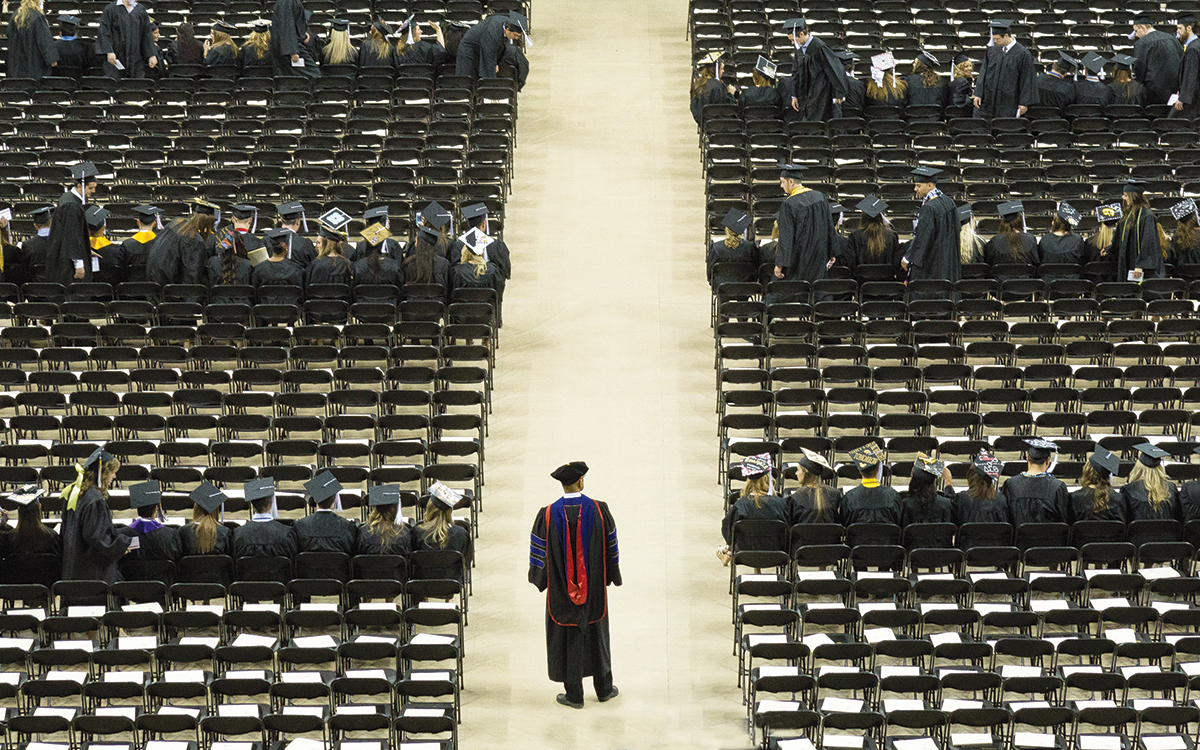
What does it take to destroy a university system?
One might start with years of budget cuts. Then, perhaps, changes to tenure, which spark an exodus of talented faculty. Or maybe a chaotic campus restructuring plan that spooks students and ruins enrollment numbers.
In 2018, this action plan could describe any number of state universities. Twenty-four states reported drops in tax revenue in 2017, and 10 states have cut university funding by at least 25 percent since 2008.
Wisconsin has, however, met each of these benchmarks and is careening into a new chapter of austerity. In March, administrators at the University of Wisconsin-Stevens Point (UW-SP) announced that the university would eliminate 13 majors, including liberal arts tentpoles like English, history and sociology, in response to a budget shortfall.
The university, in turn, has promised eight new degree programs, including geographic information science and an MBA program – programs that UW-SP’s chancellor argued are in-demand and “meet students’ needs."
These eliminations, pending final approval, have sparked a strong reaction from professors throughout the UW-System who question the plan’s motives and rationale. Mike Williams, the chairman of UW-SP’s English department, described the paradox of eliminating his department to save jobs.
"The English education program is one of the best in the state. We have 100 percent job placement. And we have 100 teachers in high schools across the state," Williams told the local Stevens Point Journal. "They are in positions to recommend UWSP to their high school students. I don't necessarily believe that will happen anymore."
Williams also pointed out that teachers in Wisconsin cannot teach English without a bachelor’s degree in the subject. "They just both have to exist, or both have to be eliminated," Williams said. "One depends directly on the other."
The budget shortfall at the heart of the proposal has drawn incredulity, too. The university announced a budget shortfall of $4.5 million over the next two years – a fractional amount when compared to UW-SP’s $196 million operating budget.
“According to UWSP administrators, $4.5 million over two years is what stands between having a comprehensive university in Stevens Point and not having one,” said Nicholas Fleisher, a UW-Milwaukee professor and president of AAUP Wisconsin.
“Meanwhile, legislators allocated $3 million in new money to set up the Tommy Thompson Center at UW-Madison in the current two-year budget,” he added, referencing the “leadership” center meant to bolster conservative influence on UW-Madison’s campus. “[This] speaks volumes about the priorities of legislators and the UW-System president and Regents.”
The brazenness with which legislators and UW Regents have fought to curtail humanities departments is unsettling, though the national outlook may not be better. The recipe that Wisconsin politicians and Regents used to atrophy its universities – especially weakened tenure, budget cuts and program elimination – may be more widespread than you think.
Kentucky legislators are currently pushing for a change to tenure laws that would allow professors to be dismissed due to program changes, and the University of Tennessee system is considering post-tenure reviews that could open the door for abuses of power in hiring and firing.
And cuts are a constant factor, too. The University of Iowa system, citing financial trouble, has proposed restructuring and consolidating components of its system, and the University of Montana will lay off 50 faculty members to address the revenue lost as enrollment slides.
As Wisconsin can attest, these program upheavals are not encouraging new students to attend – and can further exacerbate the enrollment issues problem. But cutting departments and campus services as enrollment drops also highlights the fundamental dissonance at the heart of the current budgetary panic: Factors that are good for students, like improving graduation rates, strong and varied academic programs, and lower tuition rates are simultaneously bad for the university – or at least the university’s bottom line.
For administrators, then, the fix comes with acknowledging the problem. According to Fleisher, this means looking at the big picture. “A more fundamental problem is the way declining state funding has made campus budgets dependent on tuition revenue and thus on enrollment.”
Program eliminations at UW-SP are laying bare the extent to which, more than ever, students are expected to pay historically high tuition rates while receiving a stripped down education. Not all onlookers are taking the cuts quietly, though. A backlash from UW-SP alum has spurred efforts for a second proposal, one that presumably will retain the 13 departments threatened by the original document.
The success of the second proposal, however, will depend largely on the UW-System landscape come August – and particularly, on the restructuring project occurring in the background. Administrators, caught off-balance by the backlash, have kept quiet since the second proposal announcement. They now have the unenviable task of trying to convince the public that they can restore UW-SP’s health by chopping off a limb – a task which requires forgetting the chancellor’s own words:












